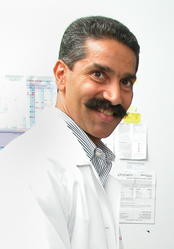|
|
|
|
|
|
|
|
|
|
|
Sam Sisodia on the
Brain
Tuesday, February
23, 5:30-8:30pm
19 South Wabash, 2d floor
Cocktails at 5:30, presentation
6:00-6:30 followed by discussion and more cocktails.
$40 includes drinks,
two cigars, and sandwiches.
Reservations are required.
 Sam Sisodia, Thomas Reynolds Sr.
Family Professor of Neurosciences and Director of the Center
for Molecular Neurobiology at the University of Chicago, will
talk about his research on the causes of Alzheimer's Disease. Sam Sisodia, Thomas Reynolds Sr.
Family Professor of Neurosciences and Director of the Center
for Molecular Neurobiology at the University of Chicago, will
talk about his research on the causes of Alzheimer's Disease.
Alzheimer’s disease (AD) is a progressive
neurodegenerative disease characterized by the deposition of A-beta
peptides in senile plaques in the brains of affected
individuals. Familial Alzheimer’s disease (FAD) is caused by
inheritance of genes encoding mutant variants of amyloid
precursor proteins (APP) or presenilin (PS). My lecture will
focus on the role of these mutant proteins in the generation
of neurotoxic A-beta-species that impair synaptic function.
In parallel, I will emphasize insights that have emerged from
studies of transgenic mice that exhibit A-beta deposits and the
impact of environmental enrichment and exercise in modulating
A-beta deposition and the generation of new neurons in the
brains of these animals.
Finally, I will describe the status of therapeutic
modalities and clinical trials aimed at attenuating A-beta
deposition.
Dr. Sangram Sisodia has received
several awards, including the Potamkin Prize for Alzheimer's Disease Research
from the American Academy of Neurology (1997); the
Metropolitan Life Foundation Award for Medical Research
(1998); Presidential Special Lecturer at the Annual Society
for Neuroscience Meeting in 2001 and 2006; and membership in
the Johns Hopkins Society of Scholars (2007) and Fellow of the
American Association for the Advancement of Science (AAAS)
(2009). Dr. Sisodia
has served on the scientific review and advisory committees
of the federal and non-federal agencies, including: NLS1
(NIH) Study Section ('95-'97); Member, NIA Board of
Scientific Counselors ('99-''04); SFN Program Committee
(2007-). He serves on
the Editorial Boards of eight journals, including Neuron and Cell and is a member
of the Dana Alliance for Brain Initiatives and Faculty of
1000 Biology.
He received his B.A. from the
College of Wooster in Ohio and his Ph.D. in Biochemistry from
the University of Georgia. He joined The Johns Hopkins
University School of Medicine as a Postdoctoral Fellow in
1985, where he rose to the rank of Professor of Pathology and
Neuroscience. He then
moved to The University of Chicago in 1998 to assume the
Chairmanship in the Department of Neurobiology, Pharmacology
and Physiology.
|
|
|
Coming up
Tuesday, March
16
Asad Hayaud Din, Consul of Pakistan, will take questions
about Pakistan, Afghanistan, India, and the world.
Tuesday, March
30
Emanuel
Mayer, Ass't Professor of Classics at the University of
Chicago, will talk about kitsch in ancient Roman art, the
rise of the middle class, and the history of the garden
gnome.
Tuesday, April
13
Lee
Allison, President of the Lee Allison Company, will talk
about style.
Tuesday,
April 27
Bill Daley, food and wine critic for the Chicago Tribune,
will lead a wine and cigar tasting.
|
|
|
|
|
|
|
|
|
About the Cigar Society of Chicago
ONE OF THE OLDEST AND
greatest traditions of the city clubs of Chicago is the discussion of
intellectual, social, legal, artistic, historical, scientific, musical,
theatrical, and philosophical issues in the company of educated,
bright, and appropriately provocative individuals, all under the
beneficent influence of substantial amounts of tobacco and
spirits. The Cigar Society of Chicago embraces
this tradition and extends it with its Informal Smokers, University
Series lectures, and Cigar Society Dinners, in which
cigars, and from time to time pipes and cigarettes, appear as an
important component of our version of the classical symposium.
To be included in the Cigar Society's mailing list, write to the
Secretary at CigarSociety@logicophilosophicus.org.
|
|
|
|